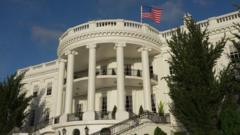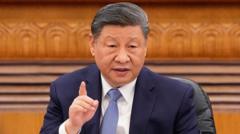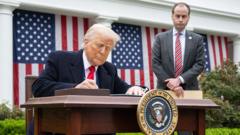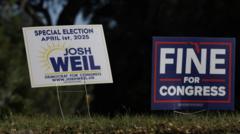**About 130 staff members were placed on leave, with only five core employees remaining, amid a contentious overhaul.**
**Wilson Center Employees Laid Off as Trump's Executive Order Restructures Foreign Policy Think Tank**

**Wilson Center Employees Laid Off as Trump's Executive Order Restructures Foreign Policy Think Tank**
**Mass layoffs at a key Washington think tank reflect President Trump’s ongoing shift in U.S. foreign policy operations.**
In a sweeping move that signals a significant restructuring of U.S. foreign policy institutions, approximately 130 employees at the Wilson Center, a respected nonpartisan think tank in Washington, D.C., have been placed on leave. This action follows President Trump's recent executive order that commands a comprehensive downsizing of the institution, which has been a pivotal player in shaping American foreign relations.
According to reliable sources, workers received email notifications informing them that they would not return to their desks after the workday ended, with redundancies expected soon after their temporary leave. This mass layoff is reminiscent of similar actions taken at other organizations under the influence of Elon Musk's operational teams, who have been enlisted to facilitate such transitions. In the current scenario, only five individuals, including the center’s president, two federal representatives, and two research fellows, will retain their positions, as stipulated by the center's congressional charter.
Furthermore, all private contributions to the Wilson Center are reportedly set to be returned to their original donors, raising questions about the future viability of the center’s endowment. As employees packed their belongings in a hurried fashion—removing personal items and files from their offices—the atmosphere inside the Ronald Reagan Building, where the center is housed, reflected a growing uncertainty about the institution's fate in this new political climate.
The rapid dismantling of the Wilson Center underscores a dramatic shift in how foreign policy is formulated and discussed within governmental frameworks, a situation that critics warn may have lasting implications on U.S. diplomatic engagement around the world.






















